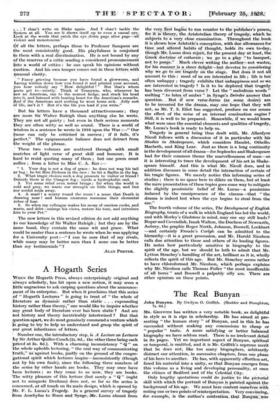A Hogarth Series
UrnEN the Hogarth Press, always enterprisingly original and always scholarly, has hit upon a new notion, it may seem a little ungracious to ask carping questions about the announce- ment of its enterprise. But when it proclaims that this series of " Hogarth Lectures " is going to treat of " the whole of literature as dynamic rather than static . . . expounding history rather than theory," one would like to. inquire whether any great body of literature ever has been static ? And are not history and theory inextricably intertwined ? But that .question apart, we do most genuinely commend a venture which Is going to try to help us understand and grasp the spirit of our great inheritance of letters. .
Number one, the introductory. step, is A Lecture on Lectures by Sir Arthur Quiller-Couch (2s. 6d., the other three being each ;priced at 8s. 6d.). With a chartning inconsistency " Q " on the whole upholds lecturing, " the oral way of communicating truth," as against books, partly on the ground of the congre;• gational spirit which lectures inspire—inconsistently (though not by his own fault), since the following--three numbers of the series by other hands are books. They may once have been lectures ; as they come. to us now, they are books. The witty pleasure of this lecture (but surely a " Q " Ought not to misquote Denham) does not, so far as the series is concerned, at all touch on its main design, which is opened by :Mr. F. L. Lucas's Tragedy. In a general survey of tragedy from Aeschylus to -Ibsen and Syrige,-..Mr,Luefts almost from the Very'first' begins° to run counter to the publisher's proem,- 'or it is- theory, the Aristotelian theory of tragedy, which he subjects to a very close examination. Throughout the book- it is shown how Aristotle's conception, with due allowances for time and . altered habits of thought; holds its own to-day, though:Mr.-Lucas does reject, for the present day at least, the creek doctrine of catharsis ; ive. go to a _play "to banquet, not to purge." : Much clevei writing the auttior=not wastes, for his manner is a sheer delightbut devotes -to eonsidering why we go to see tragedy on the stage. But does it not all amount to this : most of us are interested in life ; life is too often unhappy ; tragedy exhibits that Unhappiness and so We are interested in tragedy ? Is it to be deplored that traged3:_ has begii :divorced- from verse ? ; Let the " melodious words 7 melting ".to lutes_of amber " in_ Synge's Deirdre ,answer that question.. But.- if new verse-forms .(as _ some desire) are to be invented for the _drania,_ may, one hope that they will not, as Mr. T. S. Eliot has suggested, produce on our senses the effect of the noise of an internal combustion engine ? Still, it is well to be prepared. Meanwhile, if we would learn what were once the essential elements and qualities of tragedy,
Mr. Lucas's book is ready to help us. • •
Tragedy in general being thus dealt with, Mr. Allardyce Nicoll follows with a discussion of it in particular with his Studies in .Shakespeare, which considers Hamlet, Othello, Macbeth, and King Lear. Just as there is a long continuity in the development of all drama—for Sophocles and Shakespeare had for their common theme the marvellousness of man—so it is interesting to trace the development of his art in Shake- speare himself. And this is what Mr. Nicoll does, and in addition discusses in some detail the interaction of certain of his tragic figures. We merely notice this informing series of studies ; there is no space here to dilate on them, but at least the mere presentation of these topics goes some way to mitigate the slightly pessiniistic belief of Mr. Lucas—a pessimism induced by, the omnipresence of the cinema—that " the drama is indeed lost when the eye begins to steal from the ear."
The fourth volume of the series, The Development of English Biography, treats of a walk in which England has led the world, and with Morley's Gladstone in mind, may one say still leads ? Roper and Cavendish, Izaak Walton, the Duchess of Newcastle, Aubrey, the graphic Roger North, Johnson, Boswell, Lockhart —and certainly Froude's Carlyle can be admitted to the hierarchy—it is a great procession, and Mr. Harold Nicolson calls due attention to those and others of its leading figures. He notes hovir particularly sensitive is biography to the spirit of the age, but we should be loth to admit that Mr. Lytton Strachey's handling of the art, brilliant as it is, wholly reflects the spirit of this age. But Mr. Strachey seems rather to have chloroformed Mr. Nicolson,. which perhaps explains why Mr. Nicolson calls Thomas Fuller " the most insufferable of all bores " and Boswell a palpably silly ass. there are Other opinions on these points.








































 Previous page
Previous page